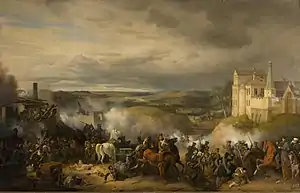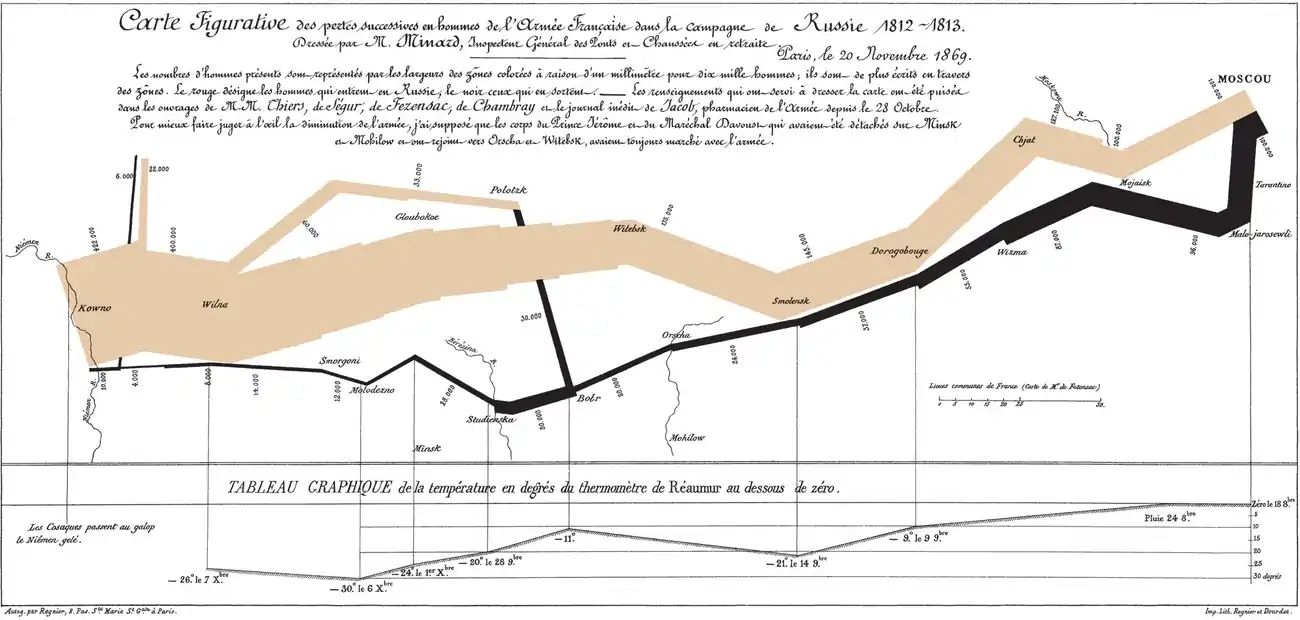Battle of Maloyaroslavets
The Battle of Maloyaroslavets took place on 24 October 1812 as part of the French invasion of Russia. It was Kutuzov's decisive battle forcing Napoleon to retreat northwest over Mozhaisk to Smolensk on the devastated route of his advance with a higher probability of starvation.[3]
| Battle of Maloyaroslavets | |||||||
|---|---|---|---|---|---|---|---|
| Part of the French invasion of Russia (1812) | |||||||
 Battle of Maloyaroslavets, by Peter von Hess | |||||||
| |||||||
| Belligerents | |||||||
|
|
| ||||||
| Commanders and leaders | |||||||
|
|
| ||||||
| Strength | |||||||
| 24,000[2] |
12,000 infantry 3,000 cavalry 84 guns 10,000 reinforcements later on | ||||||
| Casualties and losses | |||||||
| 6,000[2] |
7,165
| ||||||
Prelude
On 19 October 1812, Napoleon evacuated Moscow and marched south-west to Kaluga, Eugene de Beauharnais leading the advance. On the 23 October 1812 Beauharnais drove General Dokhturov out of Maloyaroslavets. Kutuzow sent reinforcements during the night to stop the Grande Armée.[4]
The battle
Dokhturov entered the town from the south and found the French spearhead had seized a bridgehead. Fierce fighting began. General Raevski arrived with 10,000 more Russians; once more they took the town, though not the bridgehead. De Beauharnais threw in his 15th (Italian) division, under Domenico Pino (Minister of War of the Kingdom of Italy), and by evening they had again expelled the Russians. During the course of the engagament the town changed hands no fewer than eight times and it was quoted that the French and in particular the Italian Royal Guard under Eugène de Beauharnais 'fought like lions'. In fact, this battle is remembered as the "Battle of the Italians".[5] Marshal Kutuzov arrived and decided against a pitched battle with the Grand Army the next day, and to retire instead to the prepared line of defense at Kaluga. The mainly French and Italian forces won a victory on the day, only to realize that "unless with a new Borodino" the way through Kaluga was closed. This allowed Kutuzov to fulfill his strategic plans to force Napoleon on the way of retreat in the north, through Mozhaisk and Smolensk, the route of his advance that he had wished to avoid. French casualties were about 6,000[2] including Delzons killed, while the Russians lost 4,412 men killed and wounded, 2,753 were missed in action.[2] More than half of Russian infantry units who fought in the city were inexperienced recruits and militiamen, which accounted for the high casualty rate among them.[6]
Aftermath
After the battle both, Kutuzov and Napoleon, retreated. Napoleon retreated northwest over Mozhaisk to Smolensk on the devastated route of his advance that he had wished to avoid. Kutuzov first retreated southwards near Kaluga and later "escorted" Napoleon on the more southern roads with better supply of food and shelter. Comparing these results Kutuzov had won the battle strategically by forcing Napoleon into a much higher risk of starvation.[7][8]
Notes
- Chandler, p. 1041.
- Clodfelter, M. Warfare and Armed Conflicts: A Statistical Encyclopedia of Casualty and Other Figures, 1492-2015, 4th ed. McFarland. 2017. P. 164
- Napoleons Retreat from Moscow 1812, Epic History TV 2019 with English comment on YouTube
- Wencker-Wildberg (1999) Napoleon - Die Memoiren seines Lebens, Band 13, p. 107
- Commission française d'histoire militaire (1991) L'influence de la Révolution française sur les armées en France, en Europe, et dans le monde: actes. Fondation pour les études de défense nationale, p. 64
- "Васильев А. А. Сражение при Малоярославце 12.10.1812 // Малоярославец (очерки по истории города): К 180-летию Отечественной войны 1812 года. Малоярославец, 1992. С. 16-87, 143-148" (PDF).
- Kutusov, Russian movie from 1944 with English subtitles on YouTube
- Napoleonic Wars in Russia Episode 4, Russian Star Media 2014 with English subtitles on YouTube
Sources
- Chandler, David (1966). The Campaigns of Napoleon. New York: Macmillan.
